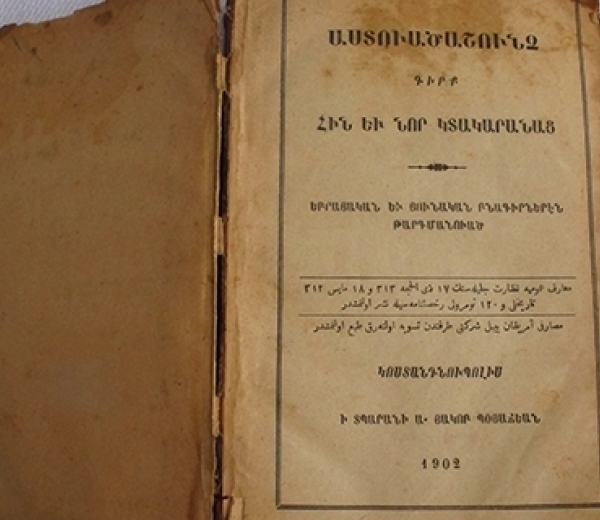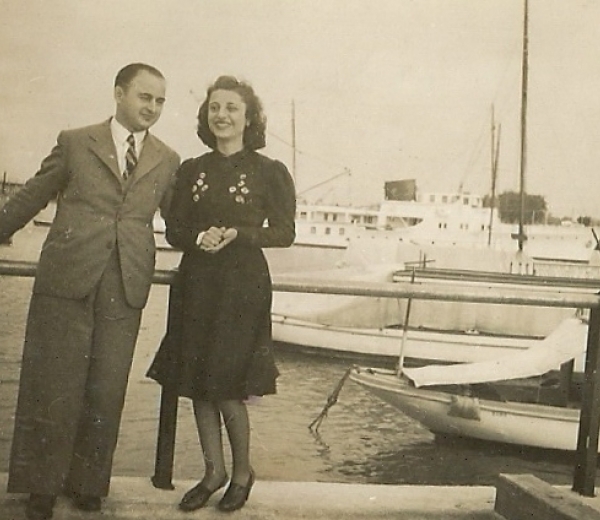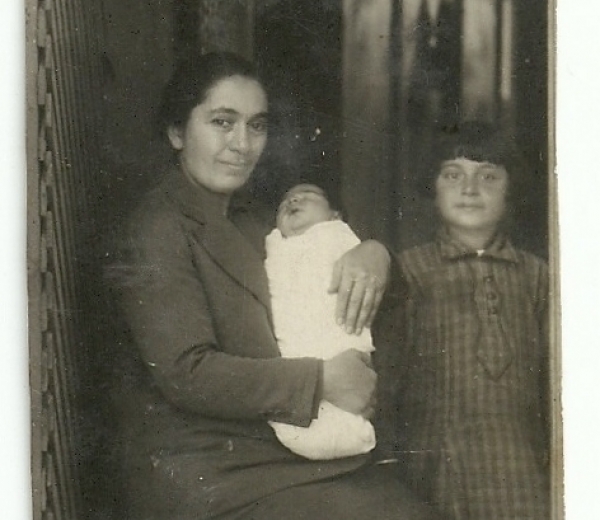Brenda Vaneskeheian
Submitted by global publisher on Tue, 08/02/2016 - 16:29
English
Intro:
Brenda Vaneskeheian, known by her stage name Bren Vaneske, is an Argentinian singer who has, in a short period of time, made great strides on the local musical underground scene. She performed at big festivals and opened for the legendary Argentinian band Attaque 77. In 2015, she released her album “Tiempo Real.” She claims to have inherited her proclivity and passion for the arts from her great-grandfather Avedis, an Armenian Genocide survivor.
Weight:
-9 900
Story elements:
Text:
Brenda Vaneskeheian, known by her stage name Bren Vaneske, is an Argentinian singer who has, in a short period of time, made great strides on the local musical underground scene. She performed at big festivals and opened for the legendary Argentinian band Attaque 77. In 2015, she released her album “Tiempo Real.” She claims to have inherited her proclivity and passion for the arts from her great-grandfather Avedis, an Armenian Genocide survivor.
Text:
Argentinian rock singer Brenda Vaneskeheian is proud to hold Teperik’s Bible; the very book that helped her great-grandmother survive the forced deportations of Armenians from the Ottoman Empire.
Teperik Caroglanian, Brenda’s maternal great-grandmother, was born in the city of Tokat in 1905. Her father was a trader who imported silk from India. The family – grandmother, mother and two younger siblings, Vartán and Verónica, lived in a two-story house.
Brenda describes her family history as “an unbelievable life experience” and sees it as a story that demands to be told.
“I think it is interesting to share because it is a combination of the horror and the love that people lived through in those days,” she explains. “There was so much immeasurable pain, but at the same time so much strength to recover from those events. These are stories that should not die with the people who lived them, they should travel the world and live in us.”
Under her performing name, Bren Vaneske, she composed “1915” in memory of her great-grandmother and all the victims of the Armenian Genocide. “I wanted to express my anger, my sadness and, at the same time, contribute my two cents as a way of doing justice to history. There was a Genocide, carried out with impunity, and it had a direct connection to my blood. All this inspired me to write, to remember. The video for the song is visceral and intense. There are no shades of gray here. If one crime goes unpunished, there can be others; this is where the cry for justice comes from, this is why we demand: ‘never again’,” says Brenda.
The holy book
In 1915, Turkish officers went door-to-door through the Armenian communities and rounded up the men in every family to serve in the army. Those who refused to go were executed on the spot, those who went rarely survived. With the city now empty of men, the women, old people and children were defenseless. Soon afterward the officers came back, evicting families into the desert on the pretext of evacuating them in the face of the oncoming conflict. Teperik was 10 years old at the time. She joined her grandmother, mother and younger siblings on the march into the desert. As they were dragged out of their home by the soldiers, Teperik’s mother managed to grab a book. She bent down, kissed Teperik on the forehead and told her that, no matter what happened, she should never be separated from this book. The book would always help her remember who she was.
It was a dreadful journey across the arid wasteland. Nobody could endure the heat, the lack of water. All family members died along the way, except for Teperik. She alone made it to the city of Tarsus, more dead than alive, and was taken in by an Arab couple who raised her as an Arab woman and expected her to marry a local man.
But she was Armenian, that was what she felt and nothing could change it. Her identity, her blood and her culture were stronger than anything else.
Teperik kept the book her mother had given her. It was a Bible written in Armenian. She read it secretly every night, so as not to forget her language or her origin. Her mother was right: this book was her guardian. She didn’t want to be an Arab woman, she didn’t want to marry an Arab man, but she couldn’t speak out, she could not reject her adoptive family. She had to keep her pain to herself.
Image:

Text:
|
The Bible that helped Teperik today guards her great-granddaughter Brenda |
New directions
One day Teperik met a young neighbor; to her surprise he was also Armenian. They started talking in secret. The young man was smitten and determined to win her heart. He turned to an Armenian friend to help him write love letters and poems to the young Teperik. Many days and letters later, one of them talked of freedom: he encouraged her to elope with him. As he promised, the following night, when everyone was sleeping, they escaped together to the city’s Red Cross College.
But fate had a further twist in store: on arriving at the college, Teperik’s rescuer introduced her to his friend Avedis, a schoolteacher. She immediately recognized the real author behind those letters. It was love at first sight, and in 1921 Teperik and Avedis got married.
Image:

Text:
|
Avedis and Teperik in Buenos Aires, Argentina |
Brenda’s maternal great-grandfather, Avedis Avedikian, was born in 1890 in the city of Adana. His parents were illiterate but they were determined to give their three children – Avedis, Hripsimé and Teolinda – a better life, supporting them through school and university. Avedis flourished, becoming a teacher of English, French and Armenian.
As World War I raged, the young couple was forced to flee. Their first destination was Greece, where their first daughter, Tsoliné, was born three years later. They lived there for five years until 1928, when they got tickets to board the ship Alcántara bound for Buenos Aires, where some friends had settled. After living through so much horror and losing their families, it was the right place to start a new life and build a new family. That was how Avedis, Teperik and little Tsoliné arrived in Latin America, where they found peace, work and a promising future. The family kept growing with the birth of three more children: Eduardo, Jorge and Arminé.
Avedis taught himself Spanish. He used to write dow Spanish words next to their Armenian equivalents.
His knowledge of other languages helped him in this process. For many years, he worked at the Goodyear tire factory while Teperik was a seamstress; this is how they integrated into Argentinian society, but without forgetting their origins or their homeland. Culture was always a part of their lives. At home, they had a well-stocked library, which included Bibles, collections of folk songs, and the works of Mikael Nalbandian, among other authors. Avedis read them attentively and wrote his own comments; he was a great admirer of Armenian literature. He never went anywhere without his notebook, in which he copied his favorite poems and also wrote some verses of his own.
Image:

Text:
|
Teperik and her daughter Tsoliné in Greece |
He never met his great-granddaughter Brenda, but his love of books, his ideas, his artistic ability, his musical skills and the inspiration to write new songs was passed on to her. Even today, she keeps some of the books that made up the Avedikians’ family library. The collection is a real heirloom, a family treasure, and one volume stands out above all the rest.
“It’s hard to believe that the Bible I now hold in my hands dates back to 1902,” Brenda says. “It represents salvation, our heritage. It is the strength and resistance that Teperik showed, holding on to this great symbol of her country and her culture. Because of all this, this Bible represents our continuity as Armenians in the Diaspora. It is the life, the history we fight for.”
“One hundred years after those tragic events I am grateful for my existence, and my family’s existence, and I thank those people who saved my ancestors. First, I thank that Arab couple who, in their own way, saved Teperik when she was a girl. Then, the young Armenian neighbor who helped her escape and find love by introducing her to Avedis, her future husband. At that point an important institution appeared, the Red Cross, which saved thousands of other Armenians besides my great-grandmother. Later, she was fortunate enough to come to Argentina. Teperik had this strong desire to live and she was so lucky that she had three chances of salvation. Thanks to that, today I can live in a country as beautiful as Argentina while remaining proud of my Armenian heritage. That heritage is exciting and emotional, it has given me a fresh, lively energy and a unique culture and identity,” Brenda concludes.
The story is verified by the 100 LIVES Research Team.
Subtitle:
Argentinean singer who never forgets her roots
Story number:
18
Author:
Eugenia Akopian
Header image:

